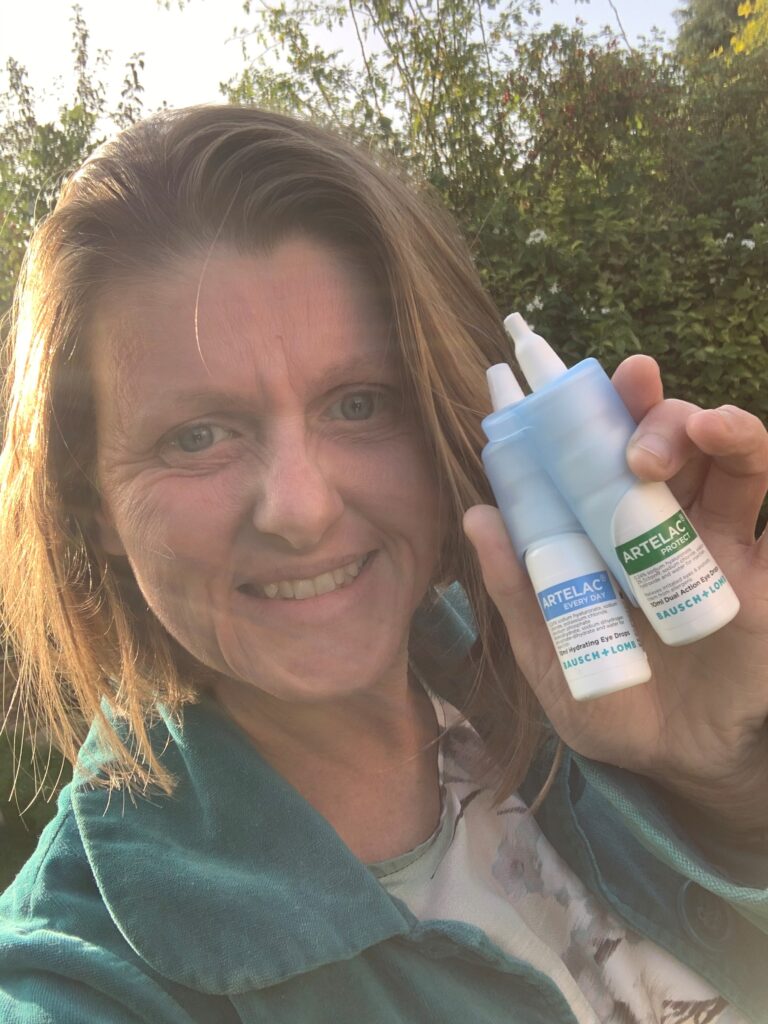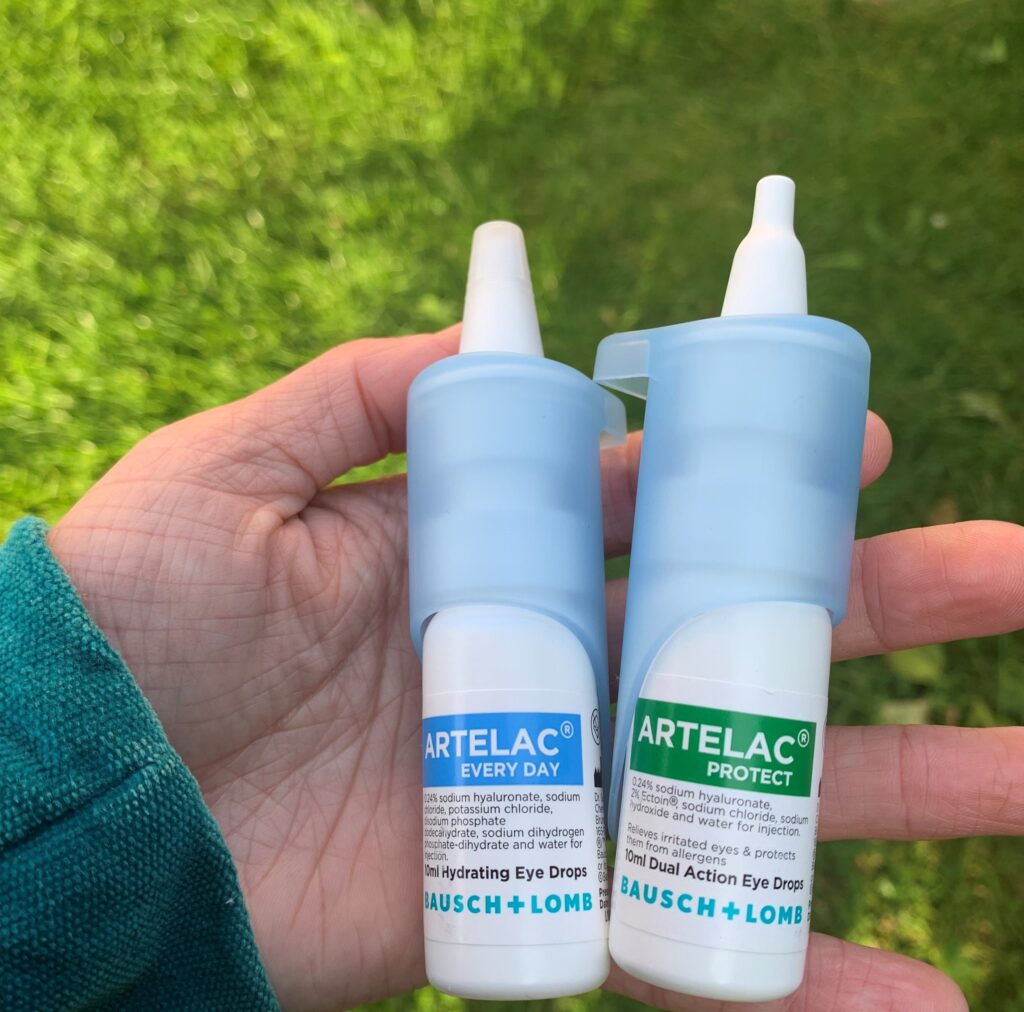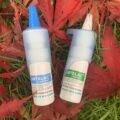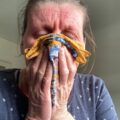Living with hay fever and constantly watery eyes is a daily challenge, juggling the seasons; those days when they’re dry and scratchy and other days when they water incessantly.
Over the years I’ve been recommended eye drops by my optician but have often been put off by the possible side effects of prolonged use, the ingredients or the taste! Yes the taste! Not that my eyes have taste buds but sometimes the drops can filter through your eyes, back down through your nose and into the back of your throat. Maybe I’m imagining this but I’ve often stopped using eye drops because of this. If they contain steroids I’m also very wary and would avoid using them.

So why are your eyes so sore? It’s important to understand what’s going. It might be hay fever but it could also be other allergen triggers such as dust, pollution , mould or that you just have dry eyes.
How do I know if I have dry eyes?
Dry eyes can happen for a number of reasons and can affect anyone at any time in their life. So many things could be irritating your eyes, including dust, lack of sleep, age (it’s more common if you’re over 50), if you wear contact lenses, nicotine smoke and the list goes on…
You may have dry eyes if your eyes are: itchy, sore, gritty, red, blurry, sensitive to light or more watery than normal.
NHS website
For me, dry eyes means they are much more watery than normal, can be puffy, especially when I wake up and can also be itchy and sore and often feel gritty, all year round! They also get gummed up, it’s hard to explain, but white sort of gummy bits clog up my eyes and can cause a lot of irritation. It can become obsessive to try to remove the grit of gum but this can oten lead to further irritate so leave eyes alone as much as possible.
There are couple of things I do regularly to keep on top of my eye health, including:
- Anti-histamines – I take a fast acting anti-histamine tablet when pollen is high. I don’t take it all the time. I know some people say to take them daily, regardless, to maintain protection but I don’t want to be taking them all the time. I need them to be effective if I have a full on allergic reaction so I err on the side of caution and try to get by without them when I can.
- Eye Drops – I’ve been using some new eye drops for dry eyes in the day time and some lubricating eye drops at nighttime. I think I’ve already been waking with less pain in the mornings. Typically my eyes can feel welded shut and painful to open at first, I think this is due the lack of natural lubrication of my dry eyes. This symptom has begun to alleviate as I progress through Topical Steroid Withdrawal (TSW) which I also find interesting. What effect did those long term topical steroids have on my eyes?
- Moisturise – I apply Aloe Vera to my eye lids and under my eyes when they are really sore and swollen. I also have a jar of oily emollient on hand and apply this first thing and throughout the day when my eyes feel dry and scratchy. It definitely makes my eyes feel less sore and the dryness on my eyelids has reduced. Doing this can also catch pollen in the emollient and so prevent some of it going in your eyes.

Why Artelac
I try to source products that only contain natural ingredients. Since cutting out topical steroids, immuno-suppressants and other drugs I’m now feeling the healthiest I have in long time. But my eyes have always watered. It’s just something I’ve got used to. So when I heard about these new eyedrops I decided to give them a go. My eyes water nearly all the time and I’m always carrying a hanky to dry the excess water.
I read the small print before using and was encouraged to see hardly any side effects listed. Always check ingredients and look for brands that you trust. Also always read any contra-indications on anything you use.
If you’re interested in finding out more, visit www.artelac.co.uk
What else can I do for dry dyes?
Always seek advice from an optician or pharmacist if you’re worried about your eyes. I’m not a specialist, I’m just sharing some simple tips that help me. The following could help you to avoid further irritation;
- Keep eyes clean – You can do this by wearing wrap around sun glassed if pollen count it high or you’re doing gardening or a dusty job.
- Wear goggles – if you’re doing a particularly dusty DIY project
- Dehumidifier – These can help to keep your home environment optimal for eye health.
- Air purifier – Can also help remove allergens and irritants from the air in your home. Keep windows closed if you can, especially on windy days.
- Sleep – Tired eyes can be more susceptible to irritation. Getting plenty of sleep can make more difference than you might realise.
- Avoid touching – It can feel like you need to rub out grit or remove something from your eye, but when you rub there is nothing there and you just make the situation worse. Try to avoid touching your eye if you can.
- Cotton Handkerchief – If you really need to do something to alleviate the itch, just a cotton hanky, not a paper tissue, to dab the eye. I find particles from paper tissue can make my eyes more irritated. Hold the hankie gently to the eye to mop up excess liquid but don’t rub!
- Relief – I find a flannel soaked in water and placed over the eyes can really help soothe. Put the flannel in the freezer or fridge for extra soothing. Ice packs also help.
You can watch this short video for more information.
And you can buy Artelac here on Amazon or from Superdrug.
Watch this space for more on my skincare routine, daily cleansing and hair care blogs/vlogs in the future!
#Ad #SponsoredPost #Artelac












Leave a Reply